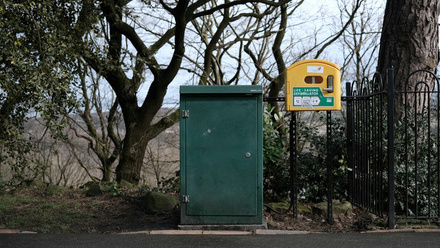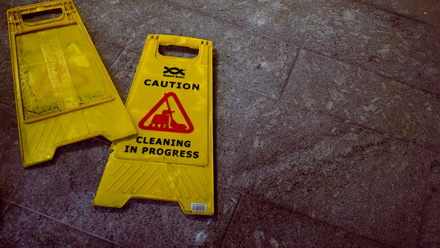White Ribbon
We are committed to ending violence against women and girls, and in November 2023, we became the first local government national body to be White Ribbon-accredited. We have joined a community of hundreds of organisations across England and Wales who have committed to stopping violence before it starts under the global symbol for ending violence against women and girls, the White Ribbon. Since achieving our accreditation, we have implemented our three-year action plan, overseen by our White Ribbon Steering Group, which includes representation from councillors, clerks and county officers.
Who are White Ribbon UK?
White Ribbon is the UK’s leading charity engaging men and boys to end violence against women and girls. White Ribbon’s mission is to prevent violence against women and girls by addressing its root causes. They work with men and boys to change long-established and harmful attitudes, systems, and behaviours around masculinity that perpetuate inequality and violence. Their work is preventative; they want to stop violence before it starts.
What is the White Ribbon campaign?
The White Ribbon campaign seeks to engage men and boys as allies in the fight against violence towards women, recognising that they play a crucial role in challenging harmful attitudes and behaviours and promoting respect, equality, and non-violence.
What is violence against women and girls?
The government has labelled violence against women and girls (VAWG) as a national threat. VAWG is a significant issue, encompassing many forms of abuse, including domestic violence, sexual violence, stalking, domestic homicide, harassment, rape and other harmful practices.
VAWG is defined in the 1993 United Nations declaration as: “Any act of gender-based violence that results in or is likely to result in, physical, sexual or psychological harm or suffering to women, including threats of such acts, coercion or arbitrary deprivation of liberty, whether occurring in public or private life”.
White Ribbon Day
White Ribbon Day is an international campaign aimed at raising awareness and taking action to end violence against women. It is observed on 25 November each year. White Ribbon Day encourages individuals, communities, and organisations to wear a white ribbon to symbolise their commitment to ending violence against women and girls. In addition to wearing white ribbons, activities and events on White Ribbon Day often include educational workshops, marches, rallies, fundraising efforts for organisations that support survivors of domestic violence, and campaigns to challenge gender stereotypes and promote healthy relationships.
Impact on individuals and communities
Violence against women and girls has profound and far-reaching impacts on both individuals and communities. For the individuals directly affected, it leads to physical injury, psychological trauma, and long-term health issues, often resulting in decreased quality of life. The ripple effects extend to families and communities, undermining social cohesion and perpetuating cycles of violence and poverty. Communities bear the economic burden of healthcare, legal services, and lost productivity, while the pervasive fear and insecurity hinder social and economic progress. Addressing this violence is thus crucial for fostering healthy, resilient, and equitable communities.
Although the statistics show that men are the perpetrators of violence against women and girls, women can be perpetrators, and men can be victims. The Office for National Statistics illustrates that in England and Wales, between October 2021 and March 2022:
- 9% of women aged 16 and over were victims of domestic abuse in the last year.
- 8% of women aged 18 to 74 experienced abuse before the age of 16.
- The victim was female in 74.1% of domestic abuse-related crimes.
- 3% of women aged 16 and over were victims of sexual assault in the last year.
- The victim was female in 86% of sexual offences.
- 9% of women aged 16 and over were victims of stalking in the last year.
How your parish and town council can get involved in the White Ribbon campaign
There are two options for parish and town councils to get involved in the campaign. You can become a White Ribbon Accredited or White Ribbon Supporter Organisation.
White Ribbon Accreditation takes a strategic approach to empowering people at all levels in the workplace to be allies. Becoming a White Ribbon Accredited is open to organisations of all sizes at any point of their journey, and the fee structure is determined by your organisation’s revenue or annual budget. Over three years, your organisation will implement an action plan developed by a steering group and supported by leadership to affect tangible change within your parish or town council.
White Ribbon Supporter Organisations are reserved for small to medium-sized businesses with less than 250 employees. They focus mainly on raising awareness about ending violence against women in their communities. They are asked to host at least one fundraiser for the White Ribbon UK charity each year. Organisations wanting to become a White Ribbon Supporter Organisation can do so directly on the White Ribbon website by filling out a form and paying a £175 plus VAT fee.
What changes can your parish or town council make?
Parish and town councils can make huge differences in women's lives in their workplaces and communities. There are many changes parish and town councils can make to help end violence against women and girls. Here are a few suggestions:
- Implement policies — Develop and enforce workplace policies that explicitly condemn harassment and violence against women. Train employees on recognising and responding to such behaviour.
- Foster a safe environment — Create a workplace culture prioritising safety, respect, and equality for all employees. Encourage open communication channels for reporting incidents of harassment or abuse.
- Support employee wellness — Offer support services such as counselling, employee assistance programmes, and flexible work arrangements for individuals affected by violence or abuse.
- Partner with community organisations — Collaborate with local shelters, advocacy groups, and service providers to support survivors and raise awareness about violence against women. Sponsor or participate in events and campaigns focused on prevention and education.
- Lead by example — Ensure that leadership within the organisation actively promotes gender equality and zero tolerance for violence against women. Model respectful behaviour and hold perpetrators accountable for their actions.
What can individuals do?
When equipped with the knowledge, individuals can make a great difference in their communities. Here are some practical steps to help you:
- Educate yourself — Take the time to educate yourself about the different forms of violence against women and the underlying causes. Understanding the issues is crucial for taking effective action.
- Speak out — Challenge sexist attitudes, language, and behaviours when you encounter them, whether it’s among friends, family, or colleagues. Silence can perpetuate harmful norms. To learn how to stand up against street harassment, take the stand up against harassment training.
- Support survivors — If someone confides in you about experiencing violence or abuse, listen to them without judgement and offer your support. Help them access resources such as hotlines, shelters, or counselling services.
- Be an active bystander — Intervene safely if you witness someone being harassed or threatened. This can involve distracting the perpetrator, checking in with the victim, or seeking help from others.
- Promote consent and respect — Advocate for and practice enthusiastic consent in all relationships and interactions. Respect boundaries and communicate openly.





